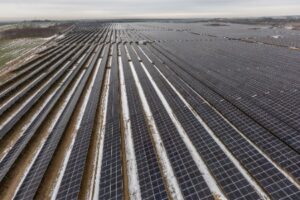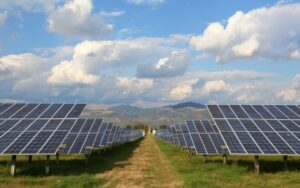New ballot committee seeks to repeal clean energy permitting changes

Residents from across the state on Thursday launched a new ballot committee to reverse recent policies granting the Michigan Public Service Commission (MPSC) permitting authority for large-scale wind and solar energy projects.
According to a statement, Citizens for Local Choice was formed by a bipartisan group of individuals to restore voters’ rights in land use decisions for industrial wind and solar operations. Several GOP lawmakers are supporting the effort.
In late November, Gov. Gretchen Whitmer signed House Bill 5120, which will allow energy providers to submit a permitting application to the Michigan Public Service Commission if the community impacted fails to approve or deny their application in a timely manner, if the local zoning process is stricter than the standards outlined in the bill, or if a project meets zoning standards outlined in the bill but the application is denied.
New House Dem permitting package adds heat to rural solar energy debate
Energy providers would also be required to participate in a locality’s permitting process if that process mirrors the state’s. Both parties would have 120 days to reach an agreement, with the option for a 120-day extension.
The commission, which consists of three members appointed by the governor, regulates energy, natural gas and telecommunications companies within the state.
House Bill 5120 and its companion, House Bill 5121, each passed along party lines, and received strong opposition from Republicans and citizens who argue the bill has stripped authority away from local governments. Following the passage of the bills, state Sen. John Damoose (R-Harbor Springs) called them a “power grab” saying that while local governments are given the opportunity to provide input, the final decision is predetermined.
“The only authority that locals maintain in this power grab is the ability to say yes,” Damoose said in a statement.
The ballot effort would repeal these new laws, restoring the ability of localities to manage proposals to construct energy facilities and allowing local ordinances to regulate setback distance, structure height, shadow flicker, and the amount of light and sound emitted by energy facilities.
According to a report from the Sabin Center for Climate Change Law at Columbia Law School that was published in May 2023, 26 Michigan localities have policies blocking or restricting renewable energy developments.
“We refuse to sit on the sidelines as local control gets stripped from our communities. We are committed to this effort and believe we have a real chance to rightfully restore control back into the locals’ hands,” Norm Stephens, a committee member for Citizens for Local Choice, said in a statement. “This will no doubt be a tough battle, but it is a battle that thousands of Michigan voters and I are ready to take on.”
The committee is in the process of submitting language for consideration by the Michigan Board of State Canvassers. If approved, the committee will have 180 days to collect 356,958 valid signatures, however those signatures must be submitted by May 29 in order to appear on the November 2024 ballot. Otherwise, the initiative could be pushed back to November 2026.
“Zoning is, and should remain, a local issue. Local governments know their communities better than any unelected Lansing bureaucrat, and they especially know better than the three members of the Michigan Public Service Commission,” Rep. David Prestin (R-Cedar River) said in a statement.
While opponents argued these laws will be used to steamroll opposition to renewable energy projects in rural communities, Rep. Ranjeev Puri (D-Canton) one of the bill’s sponsors, previously testified that the legislation included strict protections against eminent domain takings of land.
“This is very much a property rights issue. If a farm owner or landowner willingly wants to lease his or her land for solar or wind, this process finds them away to be able to do just that. Far too often a local authority denies permits because someone on the township board doesn’t like the way that these look,” Puri told members of the Senate Energy and Environment Committee.
Energy providers are also required to provide their host community $2,000 for every megawatt of the project’s capacity located within that locality to fund police, fire, public safety, other infrastructure or other projects agreed on by the provider and the locality.
Should the developing company pursue an application through the MPSC, it must also provide a grant of up to 150,000 for affected local units to cover the legal costs of contesting an application.





